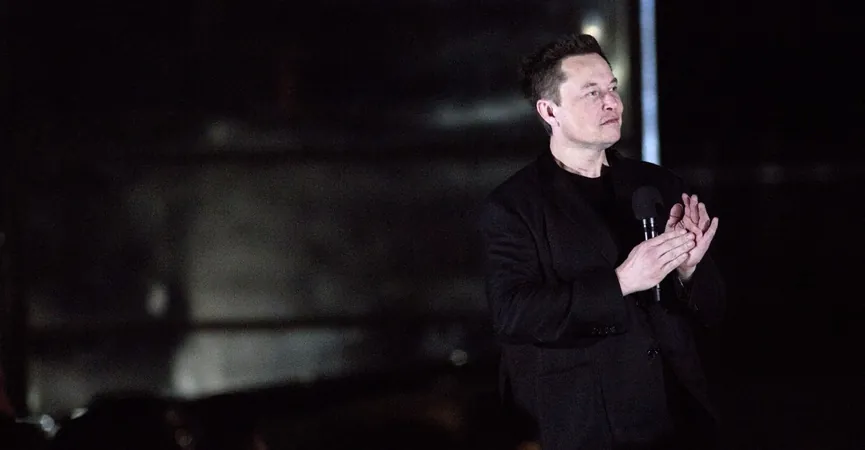
Why Living on Mars Might Be a Terrible Idea
2025-08-23
Author: John Tan
The Competing Visions of Space Explorations
In the battle for our future amongst the stars, two billionaires—Elon Musk and Jeff Bezos—stand at the forefront with radically different dreams. Musk envisions a self-sustaining human settlement on Mars, positioning it as humanity's safety net in case Earth meets its demise. On the other hand, Bezos proposes relocating heavy industry and pollution to space, dreaming of a trillion humans thriving in colossal floating cities.
The Space Race Heats Up
As private enterprises flourish, nations like the United States and China engage in a fierce competition for cosmic supremacy. China's advancements in space technology are notably swift, suggesting a future where conflicts could arise over lunar and Martian territories. But could our dreams of colonization be more complicated than we imagine?
Mars: The Last Resort?
Mars, riddled with challenges like harsh radiation, violent dust storms, and unbreathable air, is often touted as our best bet for colonization. It shares a similar day-night cycle to Earth and carries fundamental elements needed for life. Yet, esteemed astrophysicist Adam Becker argues against settling on the red planet. In his book, *More Everything Forever: AI Overlords, Space Empires, and Silicon Valley’s Crusade to Control the Fate of Humanity*, Becker critiques the ambitious visions of tech moguls, labeling them as misguided.
A Candid Conversation with Adam Becker
In his recent interview, Becker didn't hold back: “Mars is a terrible place. There’s nothing to breathe, and it’s exposed to deadly radiation. You would die if you spent too long there without protection.” His harsh analysis of Mars starkly contrasts with childhood fantasies of space exploration, influenced by the likes of *Star Trek*.
The Illusion of Escape
Despite a childhood hope for a future among the stars, Becker argues that the capitalist approach to space exploration, championed by billionaires, is fundamentally flawed. Musk's rhetoric surrounding Mars as humanity's savior echoes hollow; even if Earth faced catastrophic disasters, Mars would remain a hostile environment. In Becker's words: “There’s nothing that could happen on Earth that would make Mars a better option.”
What About Bezos's Vision?
While Bezos has criticized Mars, envisioning a future where vast space colonies could house trillions, Becker warns this too may be an unrealistic dream. Space may not be the unlimited resource we hope for, and focusing on sustainable living on Earth should be our priority.
A Call for Reflection
The allure of expanding to other planets might be enticing, but Becker insists we should shift our focus back to nurturing our home planet. “Mars is not hope. It’s a delusion,” he concludes, stressing that we should direct our energies towards making Earth a better place.
Discovering Hope on Our Own Planet
Even with the prospect of distant habitable worlds, Becker argues it's unlikely humanity would be able to reach them given our current limitations. He finds comfort in the thought that we possess the power to improve our situation here on Earth, stating, “We live in space! This is our remarkable home, brimming with resources at our fingertips.”
Savoring Our Existence
Ultimately, Becker’s message is about cherishing the extraordinary conditions we already possess on Earth. Instead of seeing Mars as a potential new home, he urges us to appreciate our own environment, where food grows freely, and the delicate balance of life thrives. Through exploration and care, we can build a brighter future without escaping to another planet.





 Brasil (PT)
Brasil (PT)
 Canada (EN)
Canada (EN)
 Chile (ES)
Chile (ES)
 Česko (CS)
Česko (CS)
 대한민국 (KO)
대한민국 (KO)
 España (ES)
España (ES)
 France (FR)
France (FR)
 Hong Kong (EN)
Hong Kong (EN)
 Italia (IT)
Italia (IT)
 日本 (JA)
日本 (JA)
 Magyarország (HU)
Magyarország (HU)
 Norge (NO)
Norge (NO)
 Polska (PL)
Polska (PL)
 Schweiz (DE)
Schweiz (DE)
 Singapore (EN)
Singapore (EN)
 Sverige (SV)
Sverige (SV)
 Suomi (FI)
Suomi (FI)
 Türkiye (TR)
Türkiye (TR)
 الإمارات العربية المتحدة (AR)
الإمارات العربية المتحدة (AR)